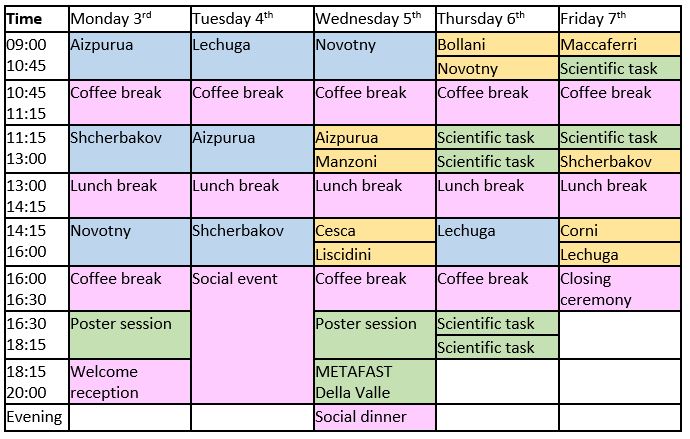Program
Final schedule
The registration will begin on Monday morning at 8:30 in Villa Grumello. Please be there on time to allow a timely start of the Opening Remarks at 8:50 before the first lecture at 9:00.
Frontal lectures are highlighted in blue, while seminars and interactive activities are highlighted in yellow and green, respectively, and described below.
Frontal lectures:
Four world-class international lecturers will give 4 hours of frontal lecturing each on the fundamentals of their research field, according to the following tentative lecture plan.
- Javier Aizpurua (University of the Basque Country, and Materials Physics Centre CSIC, San Sebastian, Spain):
Fundamentals of plasmonics
– Basics of the optical response in metals and metallic surfaces
– Basics of Nanoplasmonics
– Plasmons in Field-enhanced Spectroscopy and Microscopy
– Quantum Effects in Plasmonics
- Laura Lechuga (Catalan Institute of Nanoscience and Nanotechnology (ICN2), CSIC, Spain):
Nanophotonic biosensors for ultrasensitive and label-free diagnostics
– Introduction to Biosensors
– Nanophotonic biosensors: principles, design, fabrication and performance
– Biofunctionalization techniques towards full-compact lab-on-chip platforms
– Biosensors for the early diagnosis of diseases
- Lukas Novotny (ETH Zurich, Switzerland):
Optical trapping and control of levitated nanoparticles
– Optical Forces
– Levitodynamics
– Optical Feedback
– Coupled -Mode Theory
- Maxim Shcherbakov (University of California, Irvine):
Nano-optics in dielectric metamaterials
– Light scattering in dielectric nanostructures
– Fundamentals of dielectric nanophotonics
– Nonlinear and quantum nanophotonics on a chip
– Ultrafast and time-varying metasurfaces
After their lectures, each lecturer will give an hour-long seminar on their recent research activity, along with 4 seminars and 3 featured talks by the renowned Italian speakers. This way, the student will appreciate how the fundamentals learned during the lectures are applied in a contemporary research context.
- Cristian Manzoni, IFN-CNR Milan (Milan, Italy)
Multimodal wide-field Hyperspectral microscopy.
- Marco Liscidini, University of Pavia (Pavia, Italy):
Enhancing the quantum nonlinear light-matter interaction in photonic nanostructures: how to squeeze light out of a resonator.
- Monica Bollani, IFN-CNR LNESS (Como, Italy):
Optical metasurfaces and meta modulators: from the design to device fabrication and characterization.
- Tiziana Cesca, University of Padova (Padova, Italy):
Tunable nonlinear optical response in hyperbolic metamaterials.
- Stefano Corni, University of Padova (Padova, Italy)
Modeling the coupling of plasmonic and molecular excitations.
- Giuseppe Della Valle (Politecnico di Milano, Milano, Italy)
Nonlinear and ultrafast metasurfaces: an overview from the H2020 METAFAST project
- Nicolò Maccaferri (Umeå University, Umeå, Sweden)
Research Integrity: why it is important and why we need to talk (a lot) about it
Interactive activities:
Interactive activities promote active learning and the engagement of the students with the lecturers; for these activities, the students are gathered according to the topic they indicated in their submitted application.
- Poster session: the students will present their research activity and receive feedback from the lecturers, the organizers and their colleagues.
- Scientific task: realization of a task assigned by the lecturer and based on the content of the lectures. The students will first approach the task in small groups and then proceed to discuss the proposed solution with the lecturer.
